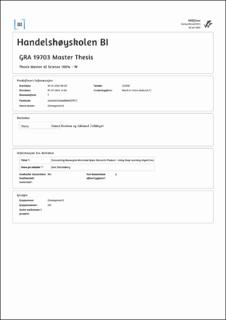| dc.description.abstract | Gross domestic product is a measure of overall economic activity. It is therefore
regarded as one of the most important summary factors for understanding the economic
state of a country. Hence, an accurate prediction of the gross domestic product
can lead to great advantages for individuals, businesses and institutions in financial
decision-making. In this thesis, we forecast the growth of the Norwegian
mainland economy using deep learning algorithms, which consists of: convolutions
neural networks, recurrent neural networks, long short-term memory and encoderdecoder
architectures. Specifically, our models utilizes quarterly-, monthly- and
daily, macroeconomic- and financial data to predict the quarterly volume change
in the Norwegian mainland gross domestic product. To evaluate the performance
of our best deep learning model, we compare our predictions to leading forecasting
actors and financial institutions, that are: Danske Bank, Norges Bank, Finansdepartementet,
Swedbank, DNB, SSB, Handelsbanken, Nordea, SEB and NHO.
In addition, we compare our predictions to a traditional time series autoregressive
model, which is a commonly used forecasting tool. This model is mainly included
as a benchmark for all the predictions.
The results reflects that our best deep learning model is performing very well,
compared to the institutions and the autoregressive benchmark model. Although,
our model shows weaknesses on forecasting for the year of 2020 where we observe
a dramatic fall in the economy. In crisis periods, such as the COVID-19 pandemic,
we clearly see the advantage of utilizing methods such as experience, judgment
and discretion in combination with models. To summarize, based on our overall
evaluation, we conclude that deep learning algorithms shows huge potential and
should be considered as a valuable tool for predicting the growth of the Norwegian
economy. | en_US |
